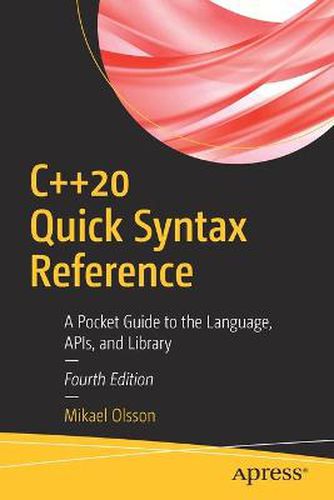Readings Newsletter
Become a Readings Member to make your shopping experience even easier.
Sign in or sign up for free!
You’re not far away from qualifying for FREE standard shipping within Australia
You’ve qualified for FREE standard shipping within Australia
The cart is loading…






This title is printed to order. This book may have been self-published. If so, we cannot guarantee the quality of the content. In the main most books will have gone through the editing process however some may not. We therefore suggest that you be aware of this before ordering this book. If in doubt check either the author or publisher’s details as we are unable to accept any returns unless they are faulty. Please contact us if you have any questions.
This quick C++ 20 guide is a condensed code and syntax reference to the popular programming language, fully updated for C++20. It presents the essential C++20 code syntax in a well-organized format that can be used as a handy reference.
This edition covers topics including designated initializers, lambdas and lambda captures, the spaceship operator, pack expressions, string literals as template parameters, atomic smart pointers, and contracts. It also covers library changes including extended futures, latches and barriers, task blocks, and text formatting.
In the C++20 Quick Syntax Reference, you will find short, simple, and focused code examples. This book includes a well-laid-out table of contents and a comprehensive index allowing for easy review. You won’t find any technical jargon, bloated samples, drawn out history lessons, or witty stories in this book. What you will find is a language reference that is concise, to the point, and highly accessible. The book is packed with useful information and is a must-have for any C++ programmer.
What You’ll Learn
Discover the key C++20 features Work with concepts to constrain template arguments Use modules as a replacement for header files Take advantage of the three-way comparison operator Create immediate functions using the consteval keyword Make use of constexpr, constinit and designated initializers
Who This Book Is For
Experienced C++ programmers. Additionally, this is a concise, easily-digested introduction for other programmers new to C++.
$9.00 standard shipping within Australia
FREE standard shipping within Australia for orders over $100.00
Express & International shipping calculated at checkout
This title is printed to order. This book may have been self-published. If so, we cannot guarantee the quality of the content. In the main most books will have gone through the editing process however some may not. We therefore suggest that you be aware of this before ordering this book. If in doubt check either the author or publisher’s details as we are unable to accept any returns unless they are faulty. Please contact us if you have any questions.
This quick C++ 20 guide is a condensed code and syntax reference to the popular programming language, fully updated for C++20. It presents the essential C++20 code syntax in a well-organized format that can be used as a handy reference.
This edition covers topics including designated initializers, lambdas and lambda captures, the spaceship operator, pack expressions, string literals as template parameters, atomic smart pointers, and contracts. It also covers library changes including extended futures, latches and barriers, task blocks, and text formatting.
In the C++20 Quick Syntax Reference, you will find short, simple, and focused code examples. This book includes a well-laid-out table of contents and a comprehensive index allowing for easy review. You won’t find any technical jargon, bloated samples, drawn out history lessons, or witty stories in this book. What you will find is a language reference that is concise, to the point, and highly accessible. The book is packed with useful information and is a must-have for any C++ programmer.
What You’ll Learn
Discover the key C++20 features Work with concepts to constrain template arguments Use modules as a replacement for header files Take advantage of the three-way comparison operator Create immediate functions using the consteval keyword Make use of constexpr, constinit and designated initializers
Who This Book Is For
Experienced C++ programmers. Additionally, this is a concise, easily-digested introduction for other programmers new to C++.